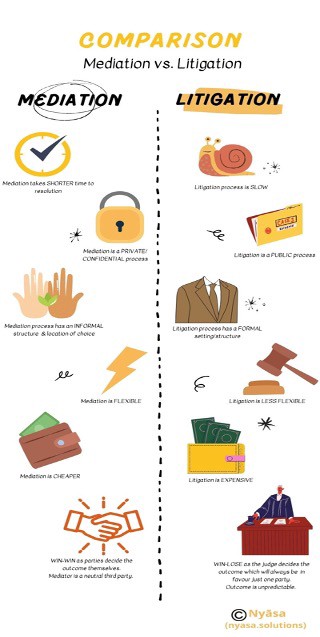Most conflicts are traditionally settled at courts through a lawyer and decided by a judge. However, legal proceedings can take a long time to settle, are often very expensive and usually only one of the parties is satisfied with the outcome. Unlike mediation, there is no win-win situation in litigation. That is why more and more people opt for alternative dispute resolution methods like mediation to settle disputes. In this article, we will discuss the benefits of mediation over litigation.
Mediation in addition to litigation
Mediation as an alternative to litigation can be used in all kinds of conflicts: from business conflicts and conflicts between employer-employee to family conflicts and divorces.
If the case is suitable for mediation in addition to litigation, the judge can propose this during a hearing. If both parties agree, the legal proceedings will be suspended.
If the parties reach a solution through mediation, they will sign a settlement agreement and the case will be settled. If no or only partial solution is found, the case goes back to the court. The latter then only pronounces on the parts of the conflict that the parties themselves could not resolve.
If parties think their case could qualify for mediation, they do not have to wait for a proposal from the judge. Parties can inquire about this with the mediation officer of the court. Each court and court of appeal has such a mediation officer.
It is suggested to start a mediation procedure before parties approach the court. For this, it is important that both parties are open to settlement and committed to resolving the dispute in a fair and amicable manner. Even when parties fail to reach a settlement, mediation can still be a productive part of settling the dispute. Mediation gives parties valuable insights into each other’s position and help to narrow down the issues that need to be addressed at trial of court.
The advantages of mediation versus litigation
The main advantages of mediation are:
- Parties can schedule mediation at a date and time that is convenient for them, rather than a date and time given by the court.
- Mediation can save parties a lot of money: documentation, expert witnesses, and various other courtroom expenses etc.
- Mediation is less time consuming.
- Settling through mediation allows parties to avoid stress and anxiety associated with going to court.
- In terms of possible outcomes, mediation is much more flexible than litigation, as parties are free to agree on matters outside the scope of the dispute, e.g., they can agree on a new long-term agreement if the mediation succeeds in restoring their relationship.
- While the mediator facilitates the mediation process about the most agreeable option for both parties, parties retain control over the outcome of their case. This is a win-win for the parties involved. This is not the situation in litigation process where a judge decides the outcome and the parties do not have a say in the decision. When parties go to the court, they are in a win-lose situation.
- Mediation is voluntary. The consensual and cooperative nature of a mediation procedure reduces hostility between the parties, allows parties to reach a resolution amicability without damaging their relationship any further.
- Unlike a litigation process that is a matter of public record, mediation procedure is confidential.
- Mediation is ‘without prejudice’, meaning that any statements made during the mediation process may not be disclosed in civil proceedings or in any other place without the prior written consent of all parties.
- Even when parties are unable to reach a settlement, mediation can be a productive part of the legal process. Parties can go back to where they were before the mediation procedure: parties cannot be forced to settle.


